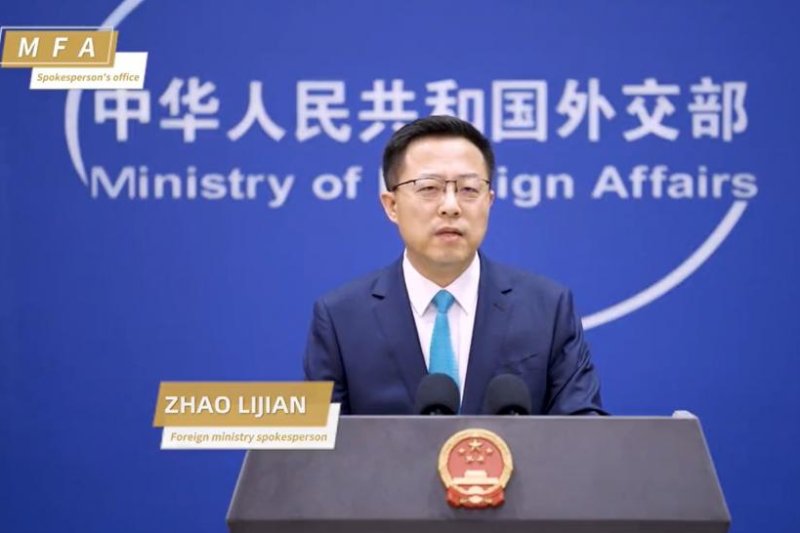China "firmly opposes" a visit by British trade policy minister Greg Hands to Taiwan, China’s Foreign Ministry spokesman Zhao Lijian said Monday. Photo courtesy of China's Foreign Ministry/
Twitter
Nov. 7 (UPI) -- China "firmly opposes" a visit by British trade policy minister Greg Hands to Taiwan, a spokesman for China's Foreign Ministry said Monday.
"On many occasions, we have already stated China's principle position," Zhao Lijian, China's Foreign Ministry spokesman, said in a video shared to Twitter.
"There is only one China in the world. Taiwan is an inalienable part of China's territory. China firmly rejects any official interaction with Taiwan by any country having diplomatic ties with China."
Zhao added that the "One China principle" is the political foundation for bilateral relations between China and Britain.
"We urge the UK to earnestly respect China's sovereignty, uphold the One China principle, stop any form of official interaction with Taiwan and stop sending wrong signals to Taiwan independence separatist forces," Zhao said.
Zhao concluded that China will "make it clear" to Taiwan's Democratic Progressive Party that an "attempt to seek independence by soliciting external support is doomed to fail."
China's rebuke of Britain comes after Hands landed in Taiwan on Monday for a two-day visit to resume in-person trade talks that were paused during the COVID-19 pandemic, his office said in a statement.
Hands will meet with Taiwan's President Tsai Ing-wen and Deputy Minister Chern-Chyi Chen as a "clear signal of the UK's commitment to boosting UK-Taiwan trade ties."
During the trade talks, Taiwan and Britain are expected to sign a Memorandum of Understanding with the Ministry of Economic Affairs in Taiwan to pledge to increase collaboration of technology and innovation.
This revelation came as China's Ministry of Foreign Affairs on Monday also criticized the United States for "stepping up pressure" on Japan and the Netherlands to join the United States in blocking the flow of advanced chip technology to China.
Mainland China and the island of Taiwan, among other islands, were ruled by the Republic of China before the ROC lost the Chinese Civil War in the early 20th century to the Chinese Communist Party, which established the new government of the People's Republic of China in October 1949.
The ROC in turn established a temporary capital in Taipei on the island of Taiwan, a former Japanese territory, in December 1949 and served as the seat for China at the United Nations until it was replaced by the People's Republic of China in 1971 as foreign countries switched their diplomatic relations.
China views Taiwan and its 23 million residents as a wayward province and has vowed to retake it by force, if necessary. Many supporters of Taiwan have since argued that it is an independent sovereign state separate from mainland China, which has never controlled Taiwan.
Earlier this year, a visit by U.S. House Speaker Nancy Pelosi to Taiwan sparked a military response from the Chinese government, which then conducted daily drills, including conducting a possible simulated attack and launching several ballistic missiles into waters near Taiwan.
Tensions between China and Western nations have continued to escalate over Taiwan in recent months.
U.S. House Speaker Nancy Pelosi (C), D-Calif., speaks to journalists during a press conference at the U.S. Embassy in Tokyo on August 5, 2022, the end of a trip to Asia with a congressional delegation. Photo by Keizo Mori/UPI |
License Photo
















